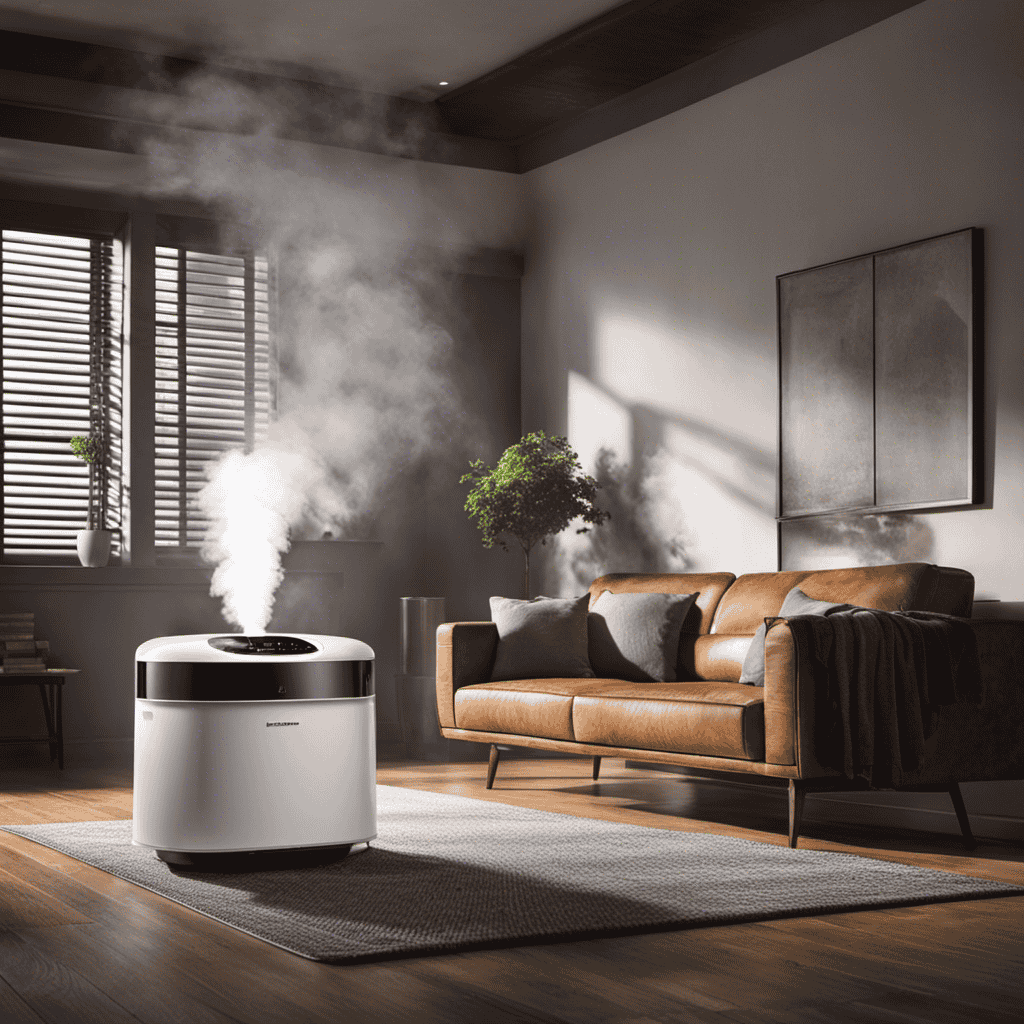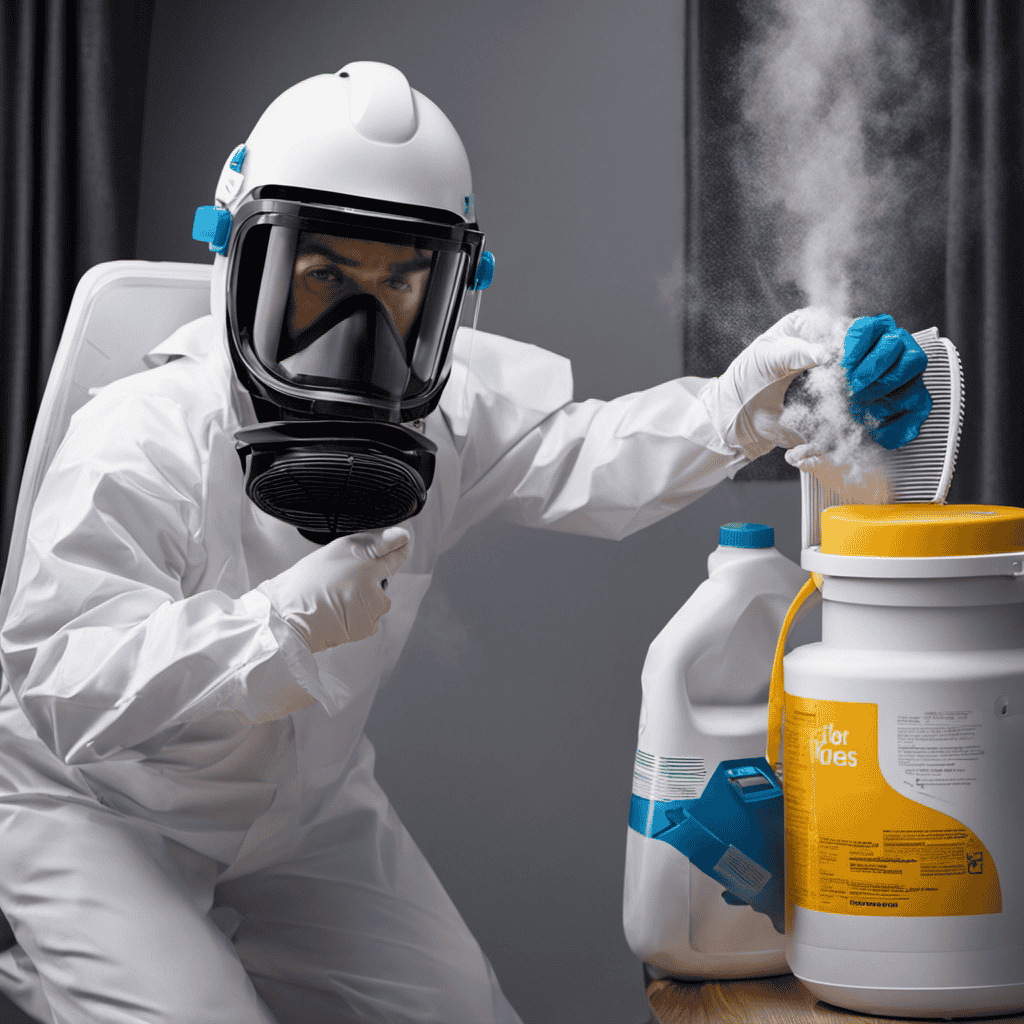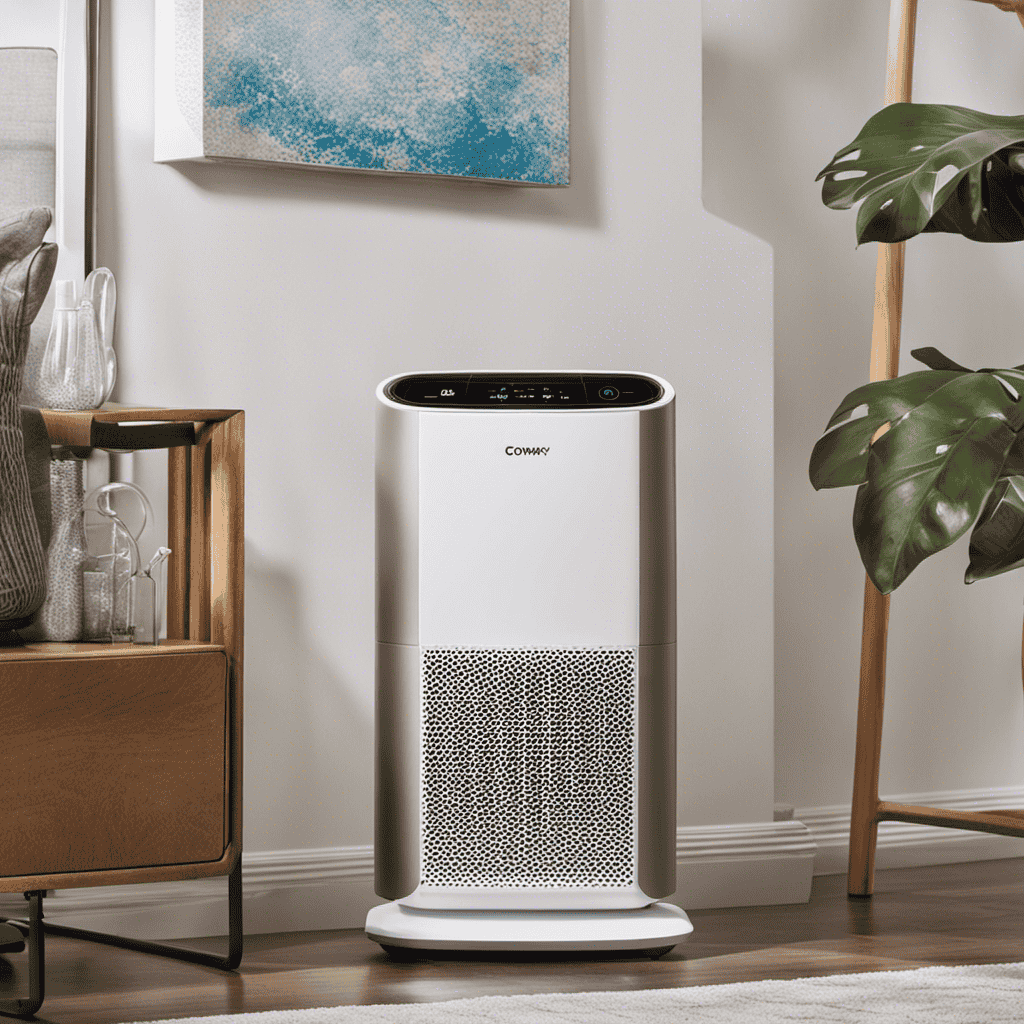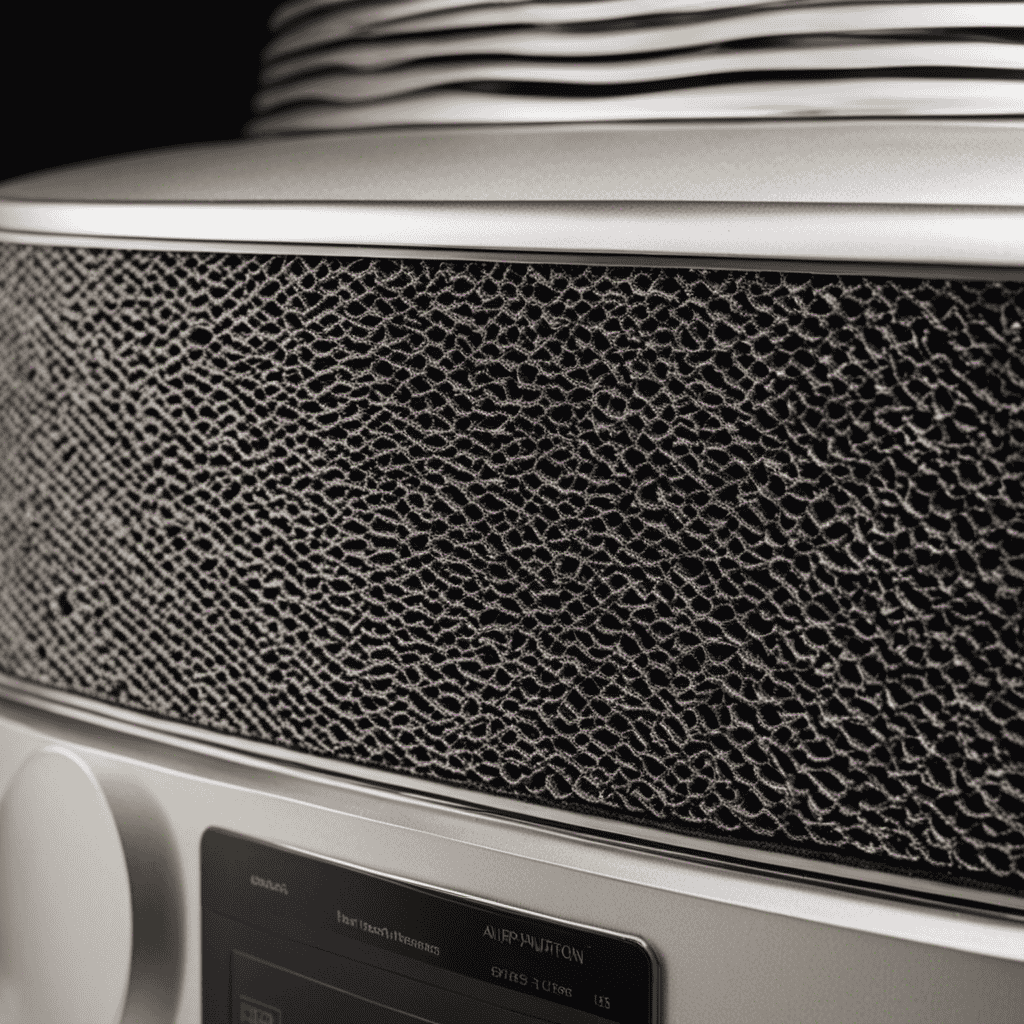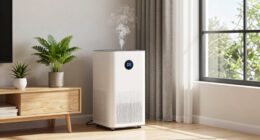As an air purifier owner, I’ve experienced a burning smell while my device was running, and it certainly caught my attention.
In this article, we’ll explore the possible causes of this peculiar odor and delve into the necessary steps to address the issue.
From ensuring proper placement and checking filters to investigating overheating and wiring concerns, we’ll leave no stone unturned in troubleshooting this problem.
So, if you’ve ever wondered why your air purifier emits a burning smell, keep reading for some informative insights.
Key Takeaways
- Proper placement of the air purifier is essential to avoid overheating and burning smells.
- Avoid placing the air purifier near heat sources like stoves or heaters to prevent potential damage or safety hazards.
- Ensure proper ventilation in the room for efficient pollutant removal and to reduce the risk of respiratory issues and allergies.
- Regularly check and maintain the air purifier filters to prevent clogging and overheating, which can lead to a burning smell.
Possible Causes of Burning Smell From Air Purifier
One of the possible causes of a burning smell from an air purifier is an overheating motor. When the motor runs for an extended period of time without proper ventilation, it can overheat and emit a burning smell.
To prevent this, it is important to follow some placement tips for your air purifier. First, make sure to place it in a well-ventilated area, away from walls and other objects that may obstruct airflow. Additionally, avoid placing it near heat sources or direct sunlight, as this can increase the temperature and lead to motor overheating.
Furthermore, regular maintenance is crucial to prevent motor overheating. Refer to the maintenance guide provided by the manufacturer for instructions on cleaning and replacing filters.
Ensuring Proper Placement of Air Purifier
When it comes to ensuring the effectiveness of an air purifier, proper placement is crucial. The ideal purifier placement should be in a central location within the room, allowing for maximum air circulation and coverage.
It is also important to avoid placing the purifier near heat sources such as radiators or stoves, as this can interfere with its performance and potentially damage the unit.
Additionally, ensuring proper ventilation in the room where the purifier is placed is essential for the efficient removal of airborne pollutants.
Ideal Purifier Placement
To ensure optimal performance, make sure you place the air purifier in an ideal location where it can effectively circulate clean air throughout the room.
Proper maintenance and optimizing air flow are crucial for the air purifier to work efficiently. When choosing a location, consider placing it in a central area of the room, away from obstructions such as curtains or furniture. This will allow for better air circulation and the removal of pollutants.
Additionally, ensure that there is enough space around the purifier for proper ventilation. Regularly clean the filters to prevent dust buildup and maintain the purifier’s effectiveness.
Avoiding Heat Sources
Make sure you keep the air purifier away from heat sources like stoves or heaters to prevent any potential damage or safety hazards. Preventing fire hazards and taking safety precautions for air purifiers should be a top priority.
Placing the air purifier near heat sources can lead to overheating and potentially cause a fire. It is important to remember that air purifiers have internal fans and motors that generate heat during operation. Placing them near heat sources can increase the risk of fire and damage the purifier’s components.
Additionally, heat sources can also affect the air purifier’s performance and efficiency. To ensure the safety and optimal functioning of your air purifier, always keep it away from sources of heat and follow the manufacturer’s guidelines for placement.
Ensuring Proper Ventilation
Ensuring proper ventilation is crucial for maintaining good air quality in your home. Ventilation maintenance plays a vital role in improving air quality by removing pollutants and circulating fresh air.
Regularly checking and cleaning your vents, ducts, and fans can help prevent the buildup of dust, allergens, and other particles that can negatively impact your indoor air quality. It is also important to ensure that your ventilation system is properly sized for your home to ensure efficient air circulation.
By maintaining proper ventilation, you can reduce the risk of respiratory issues, allergies, and other health problems associated with poor indoor air quality.
Now, let’s move on to the next step in improving air quality: checking the air purifier filters.
Checking the Air Purifier Filters
If you smell a burning odor while your air purifier is running, it’s time to check the filters. Air purifier maintenance is crucial to ensure its proper functioning and to keep the air in your home clean and fresh.
When the filters become clogged with dust, pet dander, or other particles, they can overheat and produce a burning smell. To troubleshoot the issue, start by turning off the air purifier and unplugging it. Carefully remove the filters and inspect them for any signs of damage or excessive dirt buildup.
If the filters are dirty, gently clean them or replace them with new ones if necessary. Regularly checking and cleaning the filters will not only prevent any burning smells but also enhance the overall performance of your air purifier.
Is the Air Purifier Overheating
To prevent overheating, it is important to regularly check and clean the filters of your air purifier. Here are four reasons why filter maintenance is crucial in preventing airflow obstruction and potential overheating:
-
Improved Air Quality: Clean filters ensure optimal airflow, allowing the air purifier to effectively remove pollutants from the air.
-
Enhanced Performance: When filters are clogged with dust and debris, the airflow is restricted, causing the air purifier to work harder and potentially overheat.
-
Prolonged Lifespan: Regular filter maintenance prevents strain on the motor and other internal components, extending the lifespan of your air purifier.
-
Cost Savings: By maintaining clean filters, you can avoid costly repairs or the need for a replacement unit.
Potential Issues With Air Purifier Wiring
I want to discuss the potential issues with the wiring of an air purifier, specifically focusing on two key points: overloaded electrical circuits and faulty wiring connections.
An overloaded electrical circuit occurs when there is too much demand placed on the circuit, which can lead to overheating and potential electrical fires.
A faulty wiring connection, on the other hand, refers to any loose or damaged wiring that can cause electrical malfunctions or even pose a safety hazard.
Overloaded Electrical Circuit
There’s a burning smell when the air purifier’s working, it might be due to an overloaded electrical circuit. An overloaded power supply can lead to overheating and potentially cause a fire hazard. To ensure electrical safety and prevent such issues, it’s important to take the following precautions:
-
Avoid using multiple high-powered appliances on the same circuit. Distribute the load across different circuits to prevent overloading.
-
Regularly check the power rating of your appliances and compare it to the circuit’s capacity. Ensure that the total load does not exceed the circuit’s limit.
-
Use surge protectors or power strips with built-in overload protection. These devices can automatically shut off the power supply if the load exceeds a certain threshold.
-
If you notice any burning smells or signs of overheating, immediately unplug the affected appliance and have it inspected by a qualified electrician.
Faulty Wiring Connection
A faulty wiring connection can lead to electrical malfunctions and potential safety hazards. It is crucial to prioritize wiring maintenance to ensure electrical safety in your home.
Regularly inspecting and maintaining the wiring system can help identify any potential issues before they escalate. Look for signs of frayed or damaged wires, loose connections, or exposed wiring. If you notice any of these problems, it’s important to address them promptly and seek professional help if needed.
Ignoring faulty wiring can result in electrical fires or electric shocks, posing a significant risk to you and your family. Taking proactive steps to maintain your wiring system will help prevent these hazards and ensure a safe electrical environment.
Now, let’s discuss another important aspect of maintaining a safe and efficient air purifier: dealing with excessive dust and debris buildup.
Dealing With Excessive Dust and Debris Buildup
To deal with excessive dust and debris buildup, you should regularly clean the filters in your air purifier. Keeping the filters clean is essential for preventing dust accumulation and improving air quality in your home.
Here are four reasons why regular filter cleaning is important:
-
Efficient Air Purification: When filters are clogged with dust and debris, the air purifier’s effectiveness is reduced. Cleaning the filters ensures that the purifier can efficiently remove pollutants from the air.
-
Extended Lifespan: A clean filter allows the air purifier to function optimally, increasing its lifespan. Regular maintenance can save you from having to replace the unit prematurely.
-
Health Benefits: Dust and debris can contain allergens and irritants that worsen indoor air quality. By cleaning the filters, you reduce the presence of these particles, leading to cleaner and healthier air.
-
Energy Efficiency: Clogged filters force the air purifier to work harder, consuming more energy. By regularly cleaning the filters, you can help maintain the purifier’s energy efficiency.
Addressing Mold or Mildew Growth in the Air Purifier
Regularly cleaning the filters in your air purifier is essential for addressing any mold or mildew growth and maintaining a healthy indoor environment. Mold and mildew can thrive in the moist environment created by the air purifier, especially if the filters are not cleaned regularly.
To prevent moisture buildup and the subsequent growth of mold or mildew, it is important to clean the air purifier regularly. Start by turning off the air purifier and unplugging it from the power source. Remove the filters and gently vacuum them to remove any dust or debris.
If the filters are washable, rinse them with warm water and mild detergent, then allow them to dry completely before reinstalling them. If the filters are not washable, replace them with new ones according to the manufacturer’s instructions.
Regularly cleaning the air purifier filters will not only prevent mold or mildew growth but also ensure that the air purifier functions optimally, providing clean and fresh air for you and your family.
Investigating Chemical Odors From Air Purifier
Check for any unusual chemical odors coming from your air purifier by conducting a thorough inspection of the unit. Here are some steps to help you investigate and understand the potential causes of these odors:
-
Check the filters: Examine the filters for any signs of chemical residue or degradation. Chemical reactions between the air pollutants and the filters can produce unpleasant smells.
-
Evaluate the cleaning products: If you’ve recently used cleaning products near the air purifier, their volatile compounds might be the source of the odor. Make sure the area is well-ventilated to prevent these chemicals from accumulating.
-
Consider off-gassing: Some materials used in air purifiers, like adhesives or plastic components, can release volatile organic compounds (VOCs) over time. These VOCs can create a chemical smell.
-
Assess potential health risks: Chemical odors from your air purifier may indicate the presence of harmful substances. It’s crucial to address and resolve these issues promptly to ensure your well-being.
Remember to consult the manufacturer’s instructions or seek professional assistance if you’re unsure about the cause or potential health risks associated with the chemical odors.
Troubleshooting Other Miscellaneous Factors
Make sure to keep the air purifier away from sources of heat, as excessive heat can cause certain materials to emit odors.
In addition to investigating chemical odors, it is important to troubleshoot any noise issues that may arise with your air purifier. If you notice any unusual sounds such as rattling, buzzing, or grinding, it is essential to address them promptly.
Start by checking if the air purifier is properly assembled and all parts are securely in place. Dust accumulation can also contribute to noise problems, so regular cleaning and maintenance are crucial. Ensure that the air filters are clean and replace them when necessary.
If the noise persists, contacting the manufacturer for further assistance may be required. Proper maintenance and addressing noise issues can help optimize the performance of your air purifier and ensure a quiet and efficient operation.
Frequently Asked Questions
Can a Burning Smell From an Air Purifier Be Harmful to My Health?
A burning smell from an air purifier can be harmful to your health. The causes of the burning smell should be investigated immediately, as it could indicate a malfunction or the release of harmful chemicals.
How Often Should I Clean or Replace the Filters in My Air Purifier?
Cleaning frequency and filter replacement schedule vary depending on air purifier model and usage. Regular maintenance is crucial to ensure optimal performance and prevent odors. Consult the manufacturer’s guidelines for specific recommendations.
Can the Placement of My Air Purifier Affect Its Performance or Cause a Burning Smell?
The placement of an air purifier can affect its performance, potentially causing a burning smell. It is important to ensure proper airflow and avoid placing it near heat sources or obstructing vents.
Is It Normal for an Air Purifier to Emit a Slight Burning Smell When First Used?
It’s normal for an air purifier to emit a slight burning smell when first used. While it may seem alarming, it’s usually harmless and should dissipate after a few uses.
What Should I Do if I Notice a Burning Smell Coming From My Air Purifier?
If I smell a burning smell when my air purifier is working, I would immediately unplug it and check for any visible signs of damage. If everything looks fine, I would consult the maintenance tips or troubleshooting guide for further assistance.
Conclusion
In conclusion, when encountering a burning smell from your air purifier, it is crucial to investigate the possible causes.
By ensuring proper placement, checking filters, and monitoring for overheating, you can address potential issues.
Additionally, inspecting the wiring, dealing with dust and debris buildup, and addressing mold or mildew growth are essential steps.
Furthermore, investigating chemical odors and considering other miscellaneous factors can help troubleshoot the problem.
Remember, a well-functioning air purifier is crucial for maintaining clean and fresh air in your surroundings.
